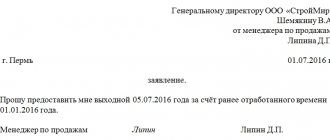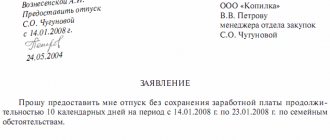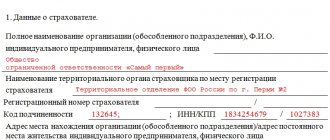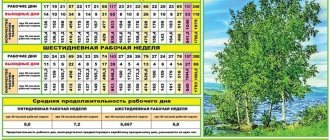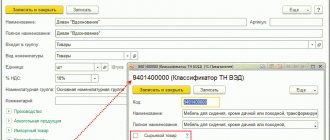Right to vacation
The first working year begins on the day the employee is hired and ends after 12 months, included in the length of service giving the right to leave. The next working year begins immediately after the end of the previous one (see also letter of Rostrud dated December 8, 2008 N 2742-6-1). In this case, the end (beginning of the next) working year may be shifted due to the fact that some periods of time are not included in the length of service giving the right to annual basic paid leave, in accordance with Art. 121 Labor Code of the Russian Federation.
Leave without pay. How to calculate the working year period
Unpaid leave (also called unpaid leave, administrative leave, or unpaid leave) refers to leave that the employee is not required to take.
In many organizations, summer is vacation time. The right of employees to annual paid leave is secured by Art. 114 Labor Code of the Russian Federation. According to Art. 115 of the Labor Code of the Russian Federation, the duration of the main annual paid leave is 28 calendar days. Additional leaves are provided to employees with special working conditions and are specified in Art. 116–119 Labor Code of the Russian Federation. But when providing and calculating leave, various nuances arise. And the first nuance is this: for what period is vacation granted? Many employees believe that vacation is provided to them for the calendar year, that is, from January 1 to December 31, and torment personnel officers with their claims. In fact (and this is stated in Article 122 of the Labor Code of the Russian Federation), vacation is provided for the working year. In this article, we will look at situations related to the provision of, in addition to paid vacations to an employee, also unpaid ones (without pay, or, as it is usually called, vacation at one’s own expense).
GOOD TO KNOW
Only an employee can initiate unpaid leave. In all cases, a written application is required to grant such leave.
Work experience for granting leave
The length of service for granting leave begins to be calculated from the first day of work of each individual employee in a given organization, that is:
- if an employee got a job on February 8, 2021, then his first working year for granting leave will be the period: 02/08/2016–02/07/2017;
- the second working year will be the period: 02/08/2017–02/07/2018;
- etc.
But this period will remain unchanged, only the years will change, subject to the condition that the entire period of the working year will comply with Art. 121 of the Labor Code of the Russian Federation, which states: the length of service on the basis of which the employer is obliged to provide basic paid leave includes the following periods of work during the year:
1) all actually worked days of this employee;
2) all days on which, in accordance with the Labor Code of the Russian Federation or collective (labor) agreements, the workplace of this employee is retained:
- holidays and weekends during this period;
- all days on which the employee was on regular leave for the previous period;
- paid days of study;
- all days of absence from work due to illness - a certificate of temporary incapacity for work, including maternity leave;
3) all days during forced absence in case of illegal dismissal, in case of reinstatement;
4) all days when the employee was suspended from work due to the fact that he did not undergo a mandatory (for this organization) medical examination, but this was not the employee’s fault;
5) vacation days at your own expense, but not more than 14 calendar days for the entire period of the working year.
The same article states that the following periods are excluded from the working year:
1) days on which the employee was absent from work without good reason (absenteeism);
2) the time of suspension from work in accordance with Art. 76 Labor Code of the Russian Federation:
- showing up at work while intoxicated;
- in cases where the employee, through his own fault, did not undergo a mandatory medical examination or knowledge test for labor safety;
- in cases where an employee is deprived of the right to carry weapons (security guard) or a driver’s license (driver) for a period of up to 2 months, provided that the employee cannot perform other functions in the organization at this time;
3) days of leave to care for children up to one and a half or three years old.
In these cases, the period of the working year, for calculating vacation, changes its boundaries to excluded periods.
GOOD TO KNOW
As a general rule, an employee’s request for unpaid leave is not obligatory for the employer.
Example 1.
A. S. Elizarova got a job on December 1, 2012.
On 09/01/2013 she took another paid leave for the period from 12/01/2012 to 11/30/2013 for 14 calendar days.
On 02/01/2014 I went on maternity leave for a period of 140 calendar days. On April 10, 2014, she gave birth to a son.
On June 21, 2014, I went on maternity leave to care for a child up to 1.5 years old.
On 10/11/2015 I left maternity leave for up to 1.5 years and took paid leave for the period from 12/01/2012 to 11/30/2013 in the amount of 14 calendar days.
10/25/2015 A. S. Elizarova took leave to care for a child up to 3 years old.
On 04/11/2017 she went to work and took paid leave for the period from 12/01/2013 to 04/10/2017 in the amount of:
- for the period from 12/01/2013 to 04/20/2014 – (28 days: 12 months x 5 months) = 12 days;
- for the period from June 21, 2014 to October 10, 2015 – excluded;
- for the period from 10/11/2015 to 10/24/2015 – (28 days: 12 months x 0.5 months) = 1 day;
- the period from 10/25/2015 to 04/10/2017 is excluded.
We get the number of days - 13 days. The next working period for obtaining leave for A. S. Elizarova will begin on 04/11/2017.
In order not to get confused with the included and excluded periods of work experience, the personnel service of the organization must record working time in monthly timesheets for the organization or division, as well as record excluded periods in the employee’s personal card in the form established in the organization (unified forms T-54, T -54a, T-2). You can also keep records in Excel or other adapted programs using calculations developed by the organization (unfortunately, almost all accounting programs are not adapted for such accounting).
GOOD TO KNOW
The employee must be familiarized with the order to grant leave against signature.
If leave without pay falls within two working years
As we noted above, in Art. 121 of the Labor Code of the Russian Federation states that vacation at one’s own expense (without pay) is included in the calculation of the working year in an amount not exceeding 14 calendar days during a given working year.
What if vacation at your own expense does not fit into the billing period? First, let's figure out what vacation at your own expense is and how it is provided.
According to Art. 128 of the Labor Code of the Russian Federation, dedicated to this leave, leave without pay is a special form of social guarantee for an employee, which is provided only upon his written application for family or other valid reasons. An application for leave without pay is written in any form, and on the basis of this application an order is issued for the organization. The management of the organization has the right to request a document confirming the reason for the leave (for example, a certificate of invitation to an unpaid session at an educational institution or a copy of the order from the main place of work for a part-time worker) both before the start of the provision of leave at their own expense, and after (marriage registration certificate, birth of a child or death of a relative). If the employee refuses to provide such documents, these days can be considered absenteeism.
GOOD TO KNOW
Since unpaid leave does not imply payment to the employee for the time he is on leave, there is no need to issue a settlement note.
Example 2.
On February 1, 2017, the wife of employee A. G. Kovalev gave birth to a child. A.G. Kovalev writes a statement to the General Director of Fakel LLC, I.Yu. Babintseva:
“I ask you to grant me leave at your own expense from 02/01/2017 to 02/05/2017 in connection with the birth of my son on 02/01/2017.”
The maximum number of days that are provided to an employee at his own expense for this type of leave is not established by the article; this is determined by agreement between the employee and the employer in each specific case.
However, the employer has an obligation to provide unpaid days to the employee for a number of reasons, regardless of the current working situation at the company. The list of such categories of employees, indicating the number of mandatory days provided, is given in Table 1.
Table 1.
| № | Employee category | Number of vacation days per year |
| 1 | Participant of the Great Patriotic War | 35 calendar days |
| 2 | Working old age pensioners | 14 calendar days |
| 3 | Parents and spouses of military personnel (firefighters, customs officers, law enforcement officers) who were killed or died from injuries in service | 14 calendar days |
| 4 | Working disabled people | 60 calendar days |
| 5 | In case of birth of a child | 5 calendar days |
| 6 | Marriage registration | 5 calendar days |
| 7 | Death of a close relative | 5 calendar days |
| 8 | Part-time worker, in case the number of days of vacation at the main place of work exceeds the part-time vacation | By the number of days making up the vacation difference |
| 9 | Employees studying or entering a higher education institution, and who at the same time combine study and work | From 15 calendar days to 4 months in accordance with Art. 173 Labor Code of the Russian Federation |
| 10 | Employees studying or entering an institution to obtain secondary vocational education, and who at the same time combine training and work | From 10 calendar days to 2 months in accordance with Art. 174 Labor Code of the Russian Federation |
At the same time, according to paragraphs. “e” clause 5 of the Decree of the Government of the Russian Federation dated December 24, 2007 No. 922 “On the specifics of the procedure for calculating average wages”, these unpaid days are not included in the calculation of average earnings for the calculation of vacation pay and other payments based on average earnings.
As you can see, vacations at your own expense can be quite long even on approved grounds, and they can fall within the boundaries of the employee’s working year. So what to do in such situations?
Example 3.
For an employee of Fakel LLC K. Yu. Romanov, who combines work and study at a higher educational institution, the periods of the working year are:
- from 03/01/2016 to 02/28/2017;
- from 03/01/2017 to 02/28/2018.
From February 15, 2017, K. Yu. Romanov takes leave without pay for a period of 90 calendar days (until May 15, 2017) to prepare and defend his thesis.
As you can see, vacation at your own expense covers both the first working year and the second.
With the first period (03/01/2016–02/28/2017) in our case everything is simple, since this period will include only 14 calendar unpaid days (from 02/15/2017 to 02/28/2017), which means that this period is considered fully worked, the period does not move, and K. Yu. Romanov is entitled to leave for this period.
But for the second working period (03/01/2017–02/28/2018) K. Yu. Romanov has 76 (90 – 14 = 76) calendar days (from 03/01/2017 to 05/15/2017). 14 calendar days from this vacation in accordance with Art. 121 of the Labor Code of the Russian Federation are accepted for the working year. This means that the second working period is shifted by 62 (76 – 14 = 62) calendar days. That is, the next vacation K. Yu. Romanov will take is not for the period from 03/01/2017 to 02/28/2018, but for the period from 05/02/2017 to 05/01/2018 (this is if he does not take any more unpaid leave during this period , otherwise his working year will shift again).
It must be remembered that if an employee took leave without pay and fell ill during this period, then the sick leave certificate for the period of leave at his own expense is not paid and the period of unpaid leave is not extended, unlike paid leave (where both sick leave and leave are paid). extended for the duration of the illness).
GOOD TO KNOW
Holidays are not included in the number of calendar days of annual paid leave (part one of Article 120 of the Labor Code of the Russian Federation). There is no similar rule for unpaid leave. Therefore, if a holiday occurs during the period of leave at your own expense, it is considered a day of such leave.
What is the difference between insurance experience and labor experience?
People most often confuse the two concepts of work and insurance experience, since they relate not only to the calculation of pensions, but to various payments and benefits, but the procedure for their application is different.
Calculation of the insurance period is necessary to establish the existence of the right to a pension. It includes the time when funds for compulsory pension insurance were deducted from the employee’s payments.
In addition, it includes a number of non-insurance periods: the time of receiving unemployment compensation, benefits for up to 1.5 years of a child, caring for a disabled person, an elderly citizen, as well as a disabled person of any age. This also includes the social activities in which the citizen was engaged.
Important! The insurance period is used not only when determining pension savings, but also when establishing the percentage of sick leave payment. The higher this indicator, the higher the percentage of payment of temporary disability benefits - from 60 to 100%.
Work experience is a generalized concept used to determine the size of a pension for periods falling before 2002. It is applied only to those employees who worked before 2002. It includes all work time, as well as work activities of public interest. -helpful character.
Nuances
Previously, people had to ask for time off, begging their employer to give them time off. It was the boss’s personal initiative to agree. Now this procedure is regulated by law.
This vacation has significant differences from a simple annual vacation:
- paid by the employee himself;
- needed for the citizen to solve problems that have arisen, and not for relaxation;
- is drawn up in accordance with the agreement reached between the parties.
It is advisable to estimate in advance how much time the employee will need. His wishes may not correspond to the employer's opinion. It is more difficult to let employees go from factories and other enterprises where people do complex work every day. It is also not easy to ask for time off from small private organizations where the staff is 3-5 people. Sometimes employers ask an employee to find a temporary replacement. A person who is ready to substitute and knows his professional responsibilities.
What conditions the employer will put forward in return and how long the provided break from work will be - the parties decide independently. Depending on the specifics of the enterprise, relationships within the team, the position held by the employee and the policy of the authorities.
Sample
The main document confirming the desire of a citizen is an application .
Duration of vacation at your own expense
Vacation at your own expense can be taken for a short period, for example, for several days. Sometimes an employee, for objective reasons, needs a longer vacation period, for example, a year. The duration of such leave will be influenced by the reasons that necessitate taking long leave without pay. It is established by agreement between the employee and the employer.
The duration of leave and the grounds for receiving it can be regulated by a collective labor agreement in the organization itself, as well as other local acts. However, the content of such documents should not contradict legal norms.
The maximum duration of unpaid leave is established only for municipal and state employees - it is 1 year. There is no limit for other employees. However, there are minimum periods obliging the employer to provide leave in certain situations.
If weekends and holidays fall during your vacation at your own expense, the vacation period is not extended. Thus, these days are taken into account when applying for administrative leave.
The duration of leave at one's own expense is determined by agreement between the employee and the employer.
How many times a year can you take vacation at your own expense?
Labor legislation does not limit the number of unpaid leaves that an employee can take.
If the employer does not object, several administrative leaves may be issued in favor of the interested employee during the year.
Example of calculating vacation pay 2021
During the period of self-isolation in 2021, some employees took leave without pay.
Details about unpaid leave are set out in our article “ Leave at your own expense during coronavirus quarantine .”
However, such unpaid leave does not deprive the employee of the right to paid leave.
Let's look at calculating vacation in 2021 using an example.
EXAMPLE
Driver Mironov O.D. The next paid leave was granted for 14 days from January 11 to January 24, 2021.
This means that the billing period is from January 1, 2021 to December 31, 2020.
The amount of wage payments included in the calculation was 530,000 rubles.
During the pay period, the employee:
- was on paid leave - 7 days in February 2020;
- was sent on a business trip - from March 2 to March 29, 2021 and from October 1 to October 31, 2020;
- did not work on days declared non-working – from March 30, 2021 to April 30, 2021, from May 6 to May 8, 2020;
- June 24, 2021 and July 1, 2021 worked;
- I was sick and took sick leave – 7 calendar days in December 2020.
So, let's determine the number of months fully worked by the employee: January, June, July, August, September, November 2021. Total - 6 months.
Let us remind you that we take June and July 2021 into account, because on days declared non-working, the employee went to work.
Number of days in months that are not fully worked:
- February 2021 – 22.23 days ((29 – 7)/29 × 29.3);
- May 2021 – 26.46 days ((31 – 3)/31 × 29.3);
- December 2021 – 22.68 days ((31 – 7)/31 × 29.3).
The average daily earnings is 2144.27 rubles (530,000.00 rubles / (29.3 × 6 months + 22.23 + 26.46 + 22.68).
Vacation pay amount:
2144.27 rub. × 14 days = RUB 30,019.78
Calculation period for 2021
To correctly calculate vacation, you need the Regulations from the Decree of the Government of the Russian Federation dated December 24, 2007 No. 922 “On the peculiarities of the procedure for calculating the average salary” (hereinafter referred to as Resolution No. 922).
According to paragraph 4 of Resolution No. 922, the calculation period for paid leave is 12 months that precede its start. We are talking specifically about calendar months.
That is, if an employee goes on vacation in February 2021, then the months from February 1, 2021 to January 31, 2021 are taken into the calculation period.
If there was parental leave in the billing period, the billing period can be replaced . In this case, take 12 months before maternity leave. This approach is reflected in the letter of the Ministry of Labor of Russia dated November 25, 2015 No. 14-1/B-972, as well as in paragraph 6 of Resolution No. 922.
There are restrictions
According to the law, an employee has the right to ask for any length of leave. This is indicated in the text of Article 128. However, federal law may set an upper limit.
They apply to state and municipal employees. They have the right to count on a maximum of one-year time off (Article 46 in Federal Law-79, also Article 21 in Federal Law-25).
In practice, it is important for employees to find the line and not get carried away. If they perform a number of important job duties on a daily basis, long absences are not advisable. And the employer will refuse to provide long time off. Ordinary employees, who can easily be replaced by others, will be released without problems, but the feasibility of continuing the business relationship will be challenged. As a result, the “walking” employee will subsequently be fired.
What should I do? Taking a sudden vacation is a citizen’s right; you just have to use it carefully. Explain to your boss the essence of the problem, discuss the conditions for obtaining free days. Perhaps the parties will reach a consensus together. Later, it is important to follow the agreement , notifying the boss in a timely manner if the situation changes. For example, the allocated days will not be enough to solve it.
If the leave is long, the employer may ask to shorten the paid period. In order for the employee to work out the days of his absence, in return he retains his place and salary.
According to the law (the provisions of Article 121), citizens have the right to take 14 days (maximum period) per year to keep their annual leave intact. The remaining days are considered surplus and will not be taken into account for calculating length of service.
An example of calculating vacation pay 2021 based on the minimum wage
Next, let's look at the example of calculating vacation pay in 2021 based on the minimum wage. According to paragraph 18 of Resolution No. 922, I calculate vacation pay based on the minimum wage in the case when the average monthly earnings of an employee who full working hours for the billing period is less than the minimum wage.
Recalculation of vacation pay according to the minimum wage must also be done if the minimum wage has increased during the vacation.
EXAMPLE
Cameraman Sergeev S.V. from December 23, 2020, I was on vacation for 28 days, of which 9 days were in December, 19 in January 2021. Vacation pay was accrued from the average daily earnings - 419 rubles/day.
Average daily earnings:
- from the minimum wage 2021 – 413.99 rubles/day. (RUB 12,130 / 29.3);
- from the minimum wage 2021 – 436.59 rubles/day. (RUB 12,792 / 29.3).
The average daily earnings for vacation days in January 2021 are less than the minimum wage (419 rubles/day < 436.59 rubles/day). Additional payment of vacation pay up to the minimum wage – 334.21 rubles. ((436.59 rub./day – 419 rub./day) × 19 days).
Documentation
Vacation without pay should be formalized by a regulatory act - an order or directive - in form T-6 . The basis is the employee’s statement. The document is signed by the head of the organization. The employee is also required to sign that he has read the order.
When going on unpaid leave, there are no vacation accruals, so a calculation note in the T-60 form is not issued.
Information about the leave granted should be entered in the employee’s personal card T-2 , in section VIII. The T-54 personal account card is also filled out
The employer may use similar documents developed independently.
Who can't be refused?
According to the law - no one . Any working citizen, even a private owner, has the right to count on the understanding of the employer. And most bosses really help.
However, there are people who cannot be refused at all if they suddenly ask for unpaid leave (annually):
· WWII participants who work – 35 days ;
· working pensioners (receiving both a pension + salary) – 14 days;
· minors are given 31 days;
· teachers, kindergarten teachers named after them – 42 days;
· doctors, nurses (medical workers) – 42-56 days;
· university teachers – maximum 56 days;
· parents/widows of deceased military personnel, as well as employees belonging to the Ministry of Internal Affairs and other law enforcement agencies - 14 days;
· disabled workers (any group) – 60 days ;
· other categories, if there is a birth of a child/wedding/death of a relative (family circumstances) – 5 days ;
· pregnant women (by the way, they cannot be fired, but there are exceptions, more details here);
· minor workers (teenagers 16 years old can be hired, they are provided with favorable conditions);
· husband, if his wife takes out maternity leave;
· people who interrupted their annual vacation prematurely ;
· foster parents who adopted a child 0-3 months old;
· employees who survived the Chernobyl/Semipalatinsk test site accident;
· blood donors;
· employees combining 2 positions at the same time;
· parents with many children, in whose family there are 3 or more children aged 0-12 years old.
Expert opinion
Andrey Tychkov, labor lawyer
It is enough for such people to voice their demands. However, the minimum duration is indicated. More can be provided if the parties agree . Employers who refuse will face fines and other types of punishment (Article 128).
Additional circumstances are specified by federal laws, as well as local acts adopted by the employer within the enterprise.
Vacation periods that the employer is required to provide
These periods depend on the reasons for leave and are specified in the Labor Code of the Russian Federation or Federal Law.
The Labor Code of the Russian Federation provides for the following deadlines:
- from 5 to 60 calendar days - according to Art. 128 Labor Code of the Russian Federation;
- from 10 days to 4 months - according to Art. 173 and 174 (for unpaid study leave);
- the estimated number of days required to comply with the required main vacation time (for example, for an external part-time worker).
According to the Federal Law, the deadlines can be:
- tied to the performance of civic duties (for example, members of election commissions are granted leave during the election period);
- are specifically defined (for holders of relevant statuses and titles, for example Hero of Labor);
- established based on the estimated number of days required to comply with the Federal Law (for example, when a military man and his wife are on simultaneous leave).
Includes weekends and holidays
It is difficult for HR officers to calculate vacation pay, because in addition to weekdays, the calendar includes weekends and several holidays. There are no direct instructions in the Labor Code regarding such a situation.
Holidays are taken into account. The legislation contains general rules according to which paid and unpaid (own account) vacation periods should be taken into account.
Weekends are more difficult. There are no specific exceptions in the Labor Code regarding vacation accounting.
It turns out that the personnel officer needs to count all available days on the calendar, no matter whether they are holidays, weekdays or weekends.
Interesting ! Workers have another option. According to the law, they have the right to divide those 14 days into several short days off. You can adapt them, excluding holidays/weekends, because then the person rests anyway.
The employee indicates when drawing up applications that he requires a Monday-Friday period. So both times. If the work week is five days, he gets 7 days off. 5 assigned + 2 simple days off.
As a result, there will be 2 full weeks, documented as 10 days.
When employers have the right to refuse
In order for management to agree to grant an employee extraordinary leave, he will need to provide a valid reason.
To confirm, submit the relevant documents:
· invitation card (if there is a wedding);
· medical direction (if treatment is required);
· death certificate (funeral of a relative);
· discharge from the maternity hospital (birth of a child).
If there is no material evidence or it is difficult to show it, justify the position in detail in the application. It is possible to indicate contact numbers of persons who can confirm the story.
The administration studies the request and transmits a response. Sometimes for a good reason and the documents collected by a person are not enough, he is refused . This is not due to personal differences that have arisen, but to the work of the enterprise. For example, when an employee performs extremely important duties, there is no one to replace him or downtime negatively affects the overall productivity of the company.
You cannot leave on your own, ignoring the employer’s refusal. Such actions are regarded as unauthorized leave. And they are subject to punishment. In particular, a person may be fined, demoted or fired.
Receiving vacation without pay
Exemption from work at the official level without pay is granted to certain categories of workers. These include the following citizens:
- WWII participants;
- people who work at the enterprise but have a pension;
- family members of military personnel who died in the line of duty;
- employees who are about to give birth to a child or have other reasons for going on vacation;
- people with a certain disability group.
Please note that the law also provides for other reasons why unpaid leave may be required. For example, in the case of a wedding or funeral of a close relative. An employer may grant exemption from duties without maintaining pay for a certain period of time, if there are compelling reasons for this. Some categories of citizens may receive leave if they need time to prepare for and enter a higher education institution. This includes all employees who took preparatory courses for further admission to the university. Persons who must take exams to enter a university also have the right to receive a release from work. A similar opportunity also exists for those people who work and undergo training at the same time.
